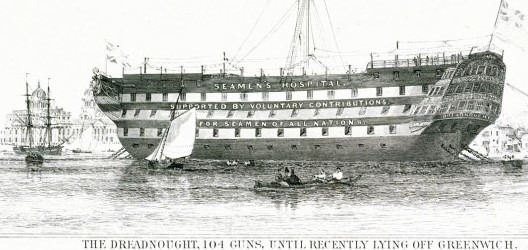HMS NHS: The Nautical Health Service
Finished! Looks like this project is out of data at the moment!
18th September 2023: HMS NHS has now been completed! HUGE thanks to everyone who contributed. The data will now be cleaned and formatted, before manual sample checking. We hope to have the data uploaded into the RMG Archive catalogue next year. Keep checking back here for further announcements, and once again, our heartfelt thanks for all your hard work, from the HMS NHS Project team: Trevor, Lucy, Graham and Martin.
Data from the first phase of HMS NHS is now available for Project teams' review and reuse. For details, see the Results page.

Transcribing a hundred years of seafarer's medical data from the Dreadnought Seamen's Hospital in Greenwich, 1826-1930.
Learn moreWe are transcribing entries from the Admissions Registers of the Dreadnought Seamen's Hospital, which provided medical care to seafarers from all over the world entering or leaving the busy port of London for over 150 years. The records form an almost unlimited number of case studies on the health of the maritime world for over a century. We want to make this data available for the research community.
Each page has a number of columns, with details about hospital patients. These would take a long time to transcribe in full. To break this down, we've made one workflow for each column in the registers. You can choose the one that interests you most, and try another whenever you like!
Each workflow has a short 'Tutorial' to get you started, together with a Field Guide containing more detailed guidance. Choose the workflow that interests you most and start transcribing!
FINAL NOTE: To complete each workflow, you will need to PAN and ZOOM over the image frequently. This is MUCH easier with a mouse, than a laptop touchpad!
- 100% complete·set selection
1. 'ADMISSION NUMBER' - 100% complete·set selection
2. 'DATE OF ENTRY' - 100% complete·set selection
3. 'NAME' - 100% complete·set selection
4. 'QUALITY' - 100% complete·set selection
5. 'AGE' - 100% complete·set selection
6. 'CREED' - 100% complete·set selection
7. 'PLACE OF BIRTH/NATIONALITY' - 100% complete·set selection
8. 'SHIP'/'SHIP OR PLACE OF EMPLOYMENT'/'LAST SHIP' - 100% complete·set selection
9. 'OF WHAT PORT'/'PORT OF REGISTRATION' - 100% complete·set selection
10. 'WHERE FROM' - 100% complete·set selection
11. 'NATURE OF COMPLAINT' - 100% complete·set selection
12. 'DATE OF DISCHARGE' - 100% complete·set selection
13. 'HOW DISPOSED OF' - 100% complete·set selection
14. 'NUMBER OF DAYS IN HOSPITAL'
Zooniverse Talk
Chat with the research team and other volunteers!
HMS NHS: The Nautical Health Service Statistics
View more statsKeep track of the progress you and your fellow volunteers have made on this project.
Every click counts! Join HMS NHS: The Nautical Health Service 's community to complete this project and help researchers produce important results. Click "View more stats" to see even more stats.
Percent completeBy the numbers
Message from the researcher
As the gateway to the busy port of London, seafarers of all nations were treated at the Greenwich Dreadnought Seamen's Hospital for well over a hundred years. What does their combined data tell us about the health of the seafaring community, the risks they faced and how medical theory applied at sea?
HMS NHS: The Nautical Health ServiceAbout HMS NHS: The Nautical Health Service
** 'HMS NHS: The Nautical Health Service'**, refers to the records of the Dreadnought Seamen’s Hospital at Greenwich. This was the main clinical site of the Seamen’s Hospital Society (now Seafarer’s Hospital Society), founded with the philanthropic mission of providing relief to sick and injured seafarers of all nations. Throughout the period 1821-1870 it was a floating hospital, based in three successive converted warships, the first named Grampus and later HMS Dreadnought, a veteran of the battle of Trafalgar. It then moved on land and until 1986 occupied the buildings which are now a student hub for the University of Greenwich.
The Admissions Registers we are transcribing include details such as a seafarer's name, age and place of birth, rank, employer and last vessel served on. Medical information includes dates of admission and discharge, medical condition, illness or injury and, at discharge, whether they were cured or not! Reflecting the international traffic of the port of London, the patients were seafarers from all over the globe. Casualties from local emergencies, among them women and children, were also admitted, as were naval personnel during wartime.
Traditionally used by family historians to trace individual maritime ancestors, the records also have significant research potential, including the history of medicine and diseases and the evolution of treatment of specific illnesses and injuries within the maritime workforce. They also show which illnesses were most prevalent in seaman returning from specific parts of the world, together with an almost unlimited number of case studies for examining how treatments changed in response to advances in medical knowledge, and the effect this had on recovery times. In addition, the records also offer additional perspectives on diverse subjects, such as the history of black and Asian communities within the maritime world. Viewed quantitatively, they show the variety and prevalence of disease, injuries and common ailments in the merchant navy for over a hundred years.